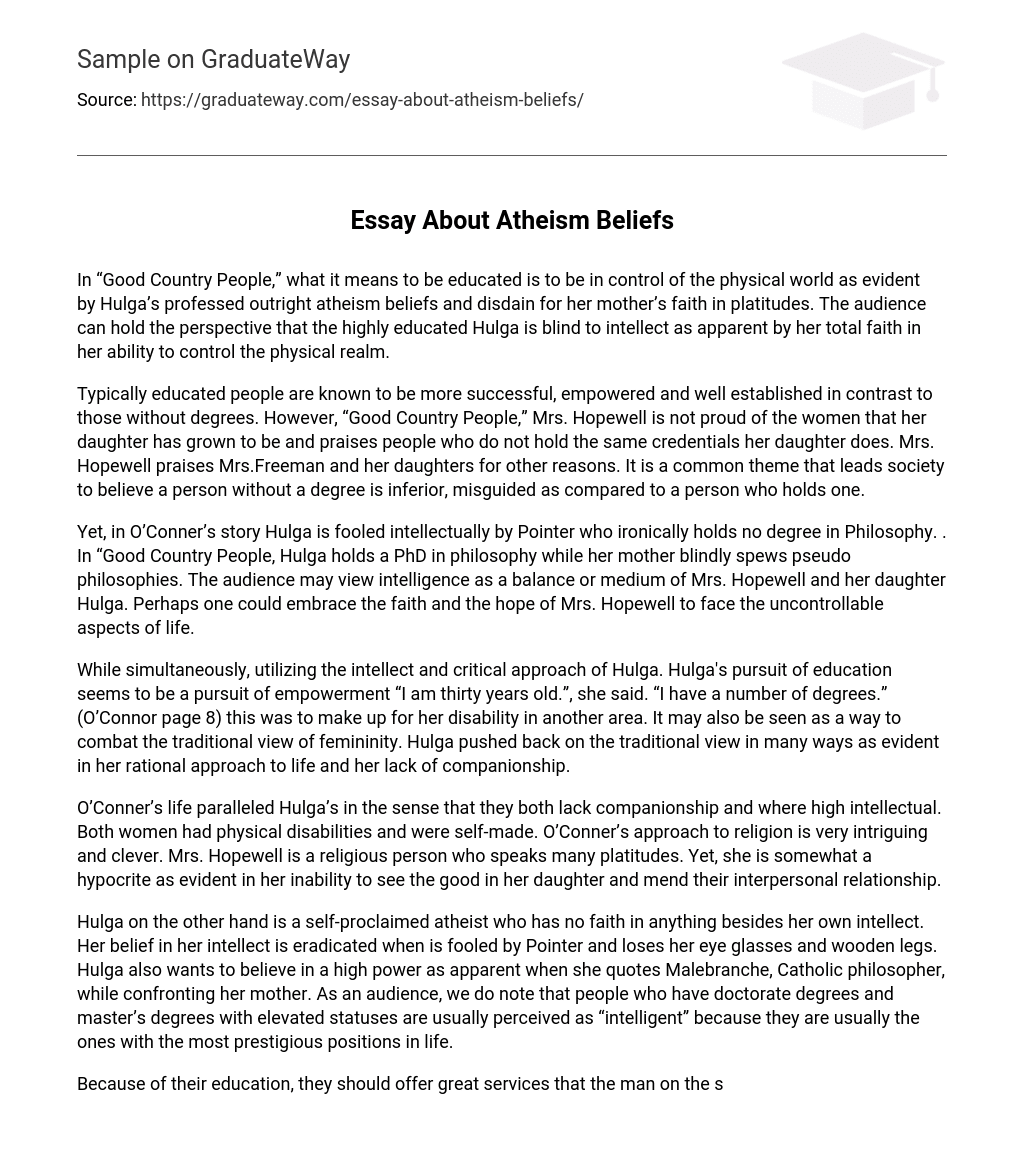In “Good Country People,” what it means to be educated is to be in control of the physical world as evident by Hulga’s professed outright atheism beliefs and disdain for her mother’s faith in platitudes. The audience can hold the perspective that the highly educated Hulga is blind to intellect as apparent by her total faith in her ability to control the physical realm.
Typically educated people are known to be more successful, empowered and well established in contrast to those without degrees. However, “Good Country People,” Mrs. Hopewell is not proud of the women that her daughter has grown to be and praises people who do not hold the same credentials her daughter does. Mrs. Hopewell praises Mrs.Freeman and her daughters for other reasons. It is a common theme that leads society to believe a person without a degree is inferior, misguided as compared to a person who holds one.
Yet, in O’Conner’s story Hulga is fooled intellectually by Pointer who ironically holds no degree in Philosophy. . In “Good Country People, Hulga holds a PhD in philosophy while her mother blindly spews pseudo philosophies. The audience may view intelligence as a balance or medium of Mrs. Hopewell and her daughter Hulga. Perhaps one could embrace the faith and the hope of Mrs. Hopewell to face the uncontrollable aspects of life.
While simultaneously, utilizing the intellect and critical approach of Hulga. Hulga’s pursuit of education seems to be a pursuit of empowerment “I am thirty years old.”, she said. “I have a number of degrees.” (O’Connor page 8) this was to make up for her disability in another area. It may also be seen as a way to combat the traditional view of femininity. Hulga pushed back on the traditional view in many ways as evident in her rational approach to life and her lack of companionship.
O’Conner’s life paralleled Hulga’s in the sense that they both lack companionship and where high intellectual. Both women had physical disabilities and were self-made. O’Conner’s approach to religion is very intriguing and clever. Mrs. Hopewell is a religious person who speaks many platitudes. Yet, she is somewhat a hypocrite as evident in her inability to see the good in her daughter and mend their interpersonal relationship.
Hulga on the other hand is a self-proclaimed atheist who has no faith in anything besides her own intellect. Her belief in her intellect is eradicated when is fooled by Pointer and loses her eye glasses and wooden legs. Hulga also wants to believe in a high power as apparent when she quotes Malebranche, Catholic philosopher, while confronting her mother. As an audience, we do note that people who have doctorate degrees and master’s degrees with elevated statuses are usually perceived as “intelligent” because they are usually the ones with the most prestigious positions in life.
Because of their education, they should offer great services that the man on the street cannot offer or perform. As stated “True genius can get an idea across even to the inferior mind”. (O’Connor page,6) With, those with advanced degrees are not necessarily the most intelligent people; but we are assured that they are more intelligent in their area of study. Manley Pointer’s cunning attributes proved that education is not needed to be deemed the “intelligent” one.
His street smarts and cunning wisdom proved far better than all the education that Hulga had gained in that moment when he expressed “I’m as good as you any day in the week.” (O’Connor page,9). To me that was when the challenge to prove who would be the intelligent one after all was conceived. As women being at the bottom of the totem pole in life as less than men intellectually, an education proves that she can study and work as well as a man in all areas.
In society, education is accepted as an empowerment for a woman, but if she doesn’t realize that there are others that are more educated than her in romance, she could be taken advantage of even with her advanced degree. In that instance she comes to “her realization in the end that she isn’t so smart… that purity has been overridden by pride of intellect through her fine education.” (Bosco, page 285).
The advanced degrees were not focused on romance so there was no guarantee that she would be successful in other areas as she wants; nor would she not be challenged in other areas that she has no ‘education’ or acute learning. “This boy, with an instinct that came from beyond wisdom, had touched the truth about her…” (Bosco, page 292). That quote alone goes to show that although he was not formerly educated as she was, the instinct that he possessed came from a place that formal education could not teach.
Although she was very educated and knew a lot, she didn’t know her true self and it took his wisdom and cunningness to touch and reveal her truth. In conclusion, “Everybody is different” (O’Connor, page 1) as Mrs. Hopewell stated, but that doesn’t mean anyone is more superior than the other based on their education level. Acquiring an education should never be to compensate for inadequacies, disappointments, or bitterness from issues that we never deal with.
What makes you wise is to learn from those things as Manly did and move toward thriving and surviving in a world where so many people look down on you or consider you less than because of what you do not have, such as an education. Education should be something to strive for but not to be superior to others or be looked at as better than, but to simply better yourself and help others.





